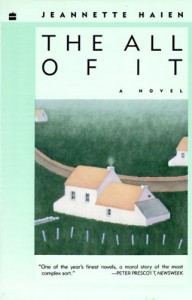The All Of It by Jeannette Haien
 Lately I’ve been reading nothing but Kindle books and needed to feel a real book in my hands. I searched my shelves and found this little volume tucked behind another row of other books. (Oh come on, you do it too, double shelve your books for maximum space.) Anyway, I’d forgotten I had this book, had never read it and apparently purchased it back in 1988 when it was first published in paperback. “Well what ya know?” I muttered to myself.
Lately I’ve been reading nothing but Kindle books and needed to feel a real book in my hands. I searched my shelves and found this little volume tucked behind another row of other books. (Oh come on, you do it too, double shelve your books for maximum space.) Anyway, I’d forgotten I had this book, had never read it and apparently purchased it back in 1988 when it was first published in paperback. “Well what ya know?” I muttered to myself.
You see, Ann Patchett single-handedly brought The All Of It back from obscurity and into a new 2011 reprinting. She hand sells this title to customers at her bookstore, Parnassus Books and she raved about it during a NPR interview several years ago. I also remembered a writer friend, who doesn’t read much contemporary fiction had sung the praises of this small novella.
So I sat down to read, two hours later I closed the book and gazed about in a daze. I had been gone, transported by Ms. Haien’s magical writing. And, oh what writing — long sentences that flow flawlessly and dialogue so realistic you actually seem to hear the characters conversations.
Set in Ireland during early 1900’s, Father DeClan is at the bedside of a dying parishioner who is only able to make a partial confession before he dies. So it is left to his widow Enda to tell him “the all of it”.
“I appreciate, Enda, that it’ll be no easier for you to tell than for me to hear”, replies Father DeClan.
“You’ll need to be patient Father,” she qualified.
“I will of course, Enda”
And so it begins — and it’s a complex and beautiful story as Father DeClan’s religious beliefs face off with the hard realities of Enda’s tale of survival. At times both subtle and harsh, The All of It lays bare the complexity of choices made and the consequences of chances taken.
Enda’s tale of hardship and struggle is juxtaposed with Father DeClan salmon fishing on an Irish river bank during a cold and drenching rainstorm. These fishing scenes add another layer of nuance – is it meant to be a metaphor? You will have to decide for yourself, but I found the fishing descriptions allegorical as the Father struggles to fish in an unkind river while trying to understand Enda’s sin.
The characters are complex in this largely dialogue-driven narrative — even the dead husband comes alive during his full life. The Father’s struggles to re-arrange his beliefs, Enda’s lack of shame in her actions — all revealed through dialogue.
The ending is somewhat unresolved, which left me creating possibilities for an ending…mulling it over long after I finished reading. I urge you to find this book at your local bookstore or library and settle down with this short novella, revel in Ms. Haien’s writing and make up your own ending.





